War for the Planet of the Apes interview: Matt Reeves on studio control, Trump analogies, and the franchise's future
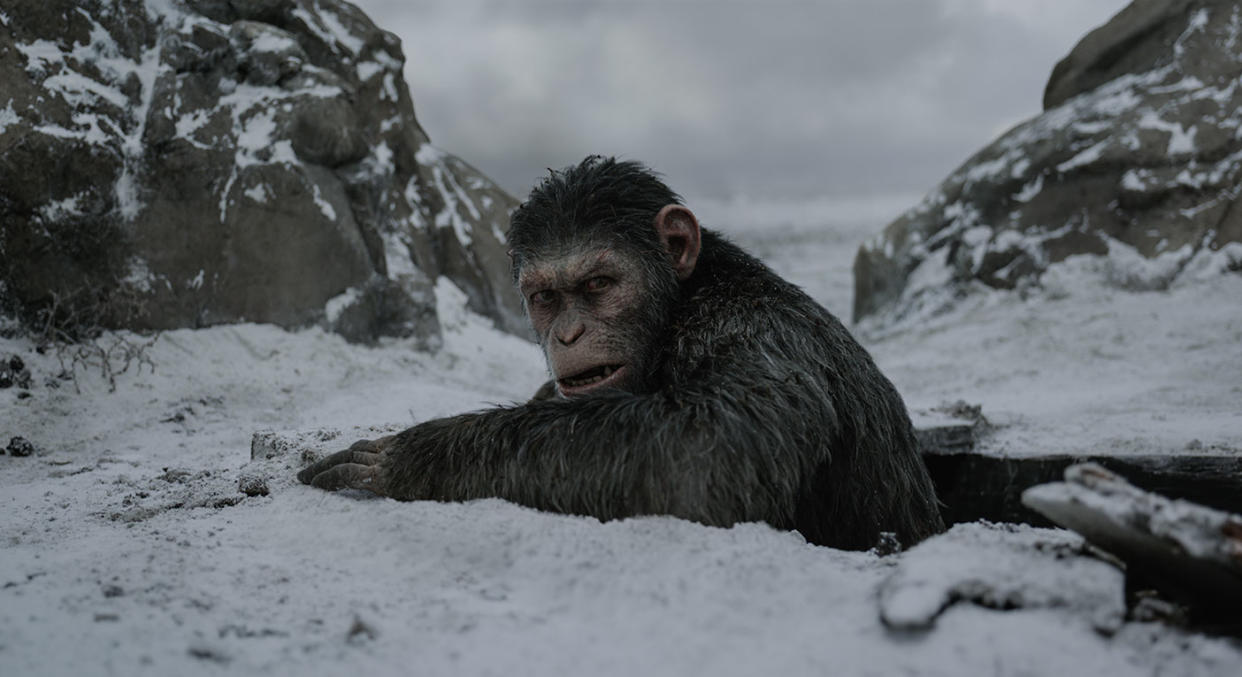
‘War For The Planet Of The Apes’ will arrive in UK cinemas on 11 July. It’s an icy blast of dystopian sci-fi that deserves to be seen on the biggest screen possible, and it wraps up the best blockbuster trilogy since Christopher Nolan’s Batman movies.
Caesar (Andy Serkis) is forced out of hiding after a confrontation with the Colonel (Woody Harrelson), the maniacal leader of a ragtag army of human survivors, and the ape leader embarks on an epic journey to tackle his new nemesis head first.
Matt Reeves, the director of ‘Cloverfield’ and 2014’s ‘Dawn of the Planet of the Apes’, returns to conclude the arc that began with 2011’s ‘Rise of the Planet of the Apes’.
We’ve already run quotes from Reeves about the future of the ‘Apes’ franchise, and his intentions for his Batman movie, but here we present our full interview with the filmmaker – verbatim – ahead of the film’s release next week.
It’s a long read because Reeves is a talker, but his passion comes across, and it gives DCEU a fans a chance to hear the passions of the future director of ‘The Batman’ direct from the horse’s mouth… or should that be ape’s?
Yahoo Movies: This is a really bleak movie for a summer blockbuster; did this cause any awkward conversations with the studio?
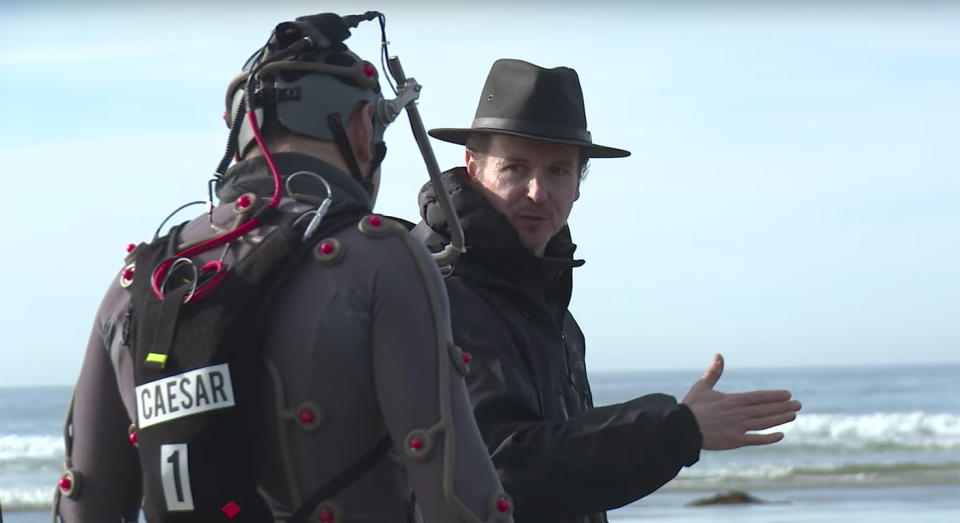
Matt Reeves: Not really, to be honest with you. I had never made a studio blockbuster before I’d made ‘Dawn [of the Planet of the Apes]’. I never would have imagined that they would let me make ‘Dawn’, but they did. It’s an amazing thing.
I think there’s something about the ‘Planet of the Apes’ franchise that, from the beginning, all of the ‘Planet of the Apes’ films have had that darkness in them. It’s part of what they’re about, because the stories are about – to some degree – our nature, and the darkness within our nature, and us trying to reconcile the different aspects of who we are; what we think of as our impulsive, darker, animal instincts, and the higher animal instincts of empathy.
We’re not the only people or creatures who empathise with each other. That’s kinda the currency of what this franchise has always been.
When I came in to ‘Dawn’ they had a story that they were doing that I didn’t relate to, and I thought I wouldn’t be doing the movie. Because I only really to something that I can use my emotions. Unless my emotional compass is in sync with the story, I don’t know where the camera goes, I don’t know what to tell the actors, so I’m useless. It’s literally survival. I have to connect emotionally; I’m like an actor in that way.
An actor has to understand what they’re doing to play it. I’m that way as a director. And so I said ‘no’, initially. Then they said, ‘wait, why are you saying no?’ I said, ‘I love this franchise, but this story I don’t relate to. I don’t think it’s the right story.’ And so they asked me ‘what would you do?’ and I pitched the story to ‘Dawn’ and they let me make that.
I thought it was going to be a Faustian bargain, I thought they would say ‘oh, you can do 30 percent of your story, and then we need that big showdown at Candlestick Park’ and I really didn’t want to go through that, because I know I won’t be able to do that scene. I’m only going to know how to do it, if I can relate to it.
They said, ‘no, listen, just come up with the story that you would do and pitch it to us, and then we’ll tell you’. I pitched them the story and I expected the bargain to come, and there was no bargain. The only bargain they did make was they said ‘listen, you can make that movie’, and I was like ‘well, what’s the bargain?’ they said ‘the bargain is you have to deliver the movie on the timeline that we already have for the release date’ which was late at that point.
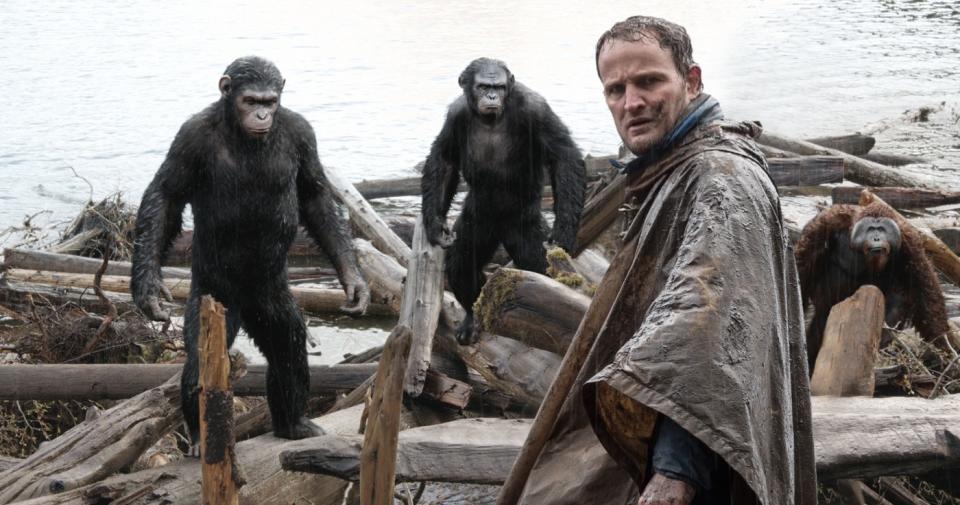
So I just dove in because I thought ‘wow, I’ve never done a blockbuster, but if I have the chance to tell this kind of story that I connect to, I have to seize it now or I might never do this’. So, they let me do it and every now and then they would say ‘hey, what about this or that?’ and I’d say ‘wait a minute, you said I could make this movie?’ and they would say ‘yes, that’s true, we did’.
I’m not saying you don’t fight about things and debate things but they let me make that movie. I don’t look back at ‘Dawn’ and say ‘the things that I think are the shortcomings in that movie, are the shortcomings of the processes of making that movie’ not because the studio was saying ‘this is too dark’, or ‘don’t do this’, that didn’t happen. Remarkably that didn’t happen on ‘War’ either.
Again, there are always debates. How much whipping is too much whipping? That kind of thing.
But you know what, they let us make that movie. It’s been a great experience.
I think the film you delivered also subverted my expectations in terms of what I’d seen in the posters, the trailers, the film’s title even…
What did you expect?
I thought, from the film’s title, it was going to be a full-on war, more action based, a battle between man and ape. But it could just have easily have been called ‘Beneath’ or ‘Escape’…
Sure.
Did you deliberately intend to subvert expectations like that?
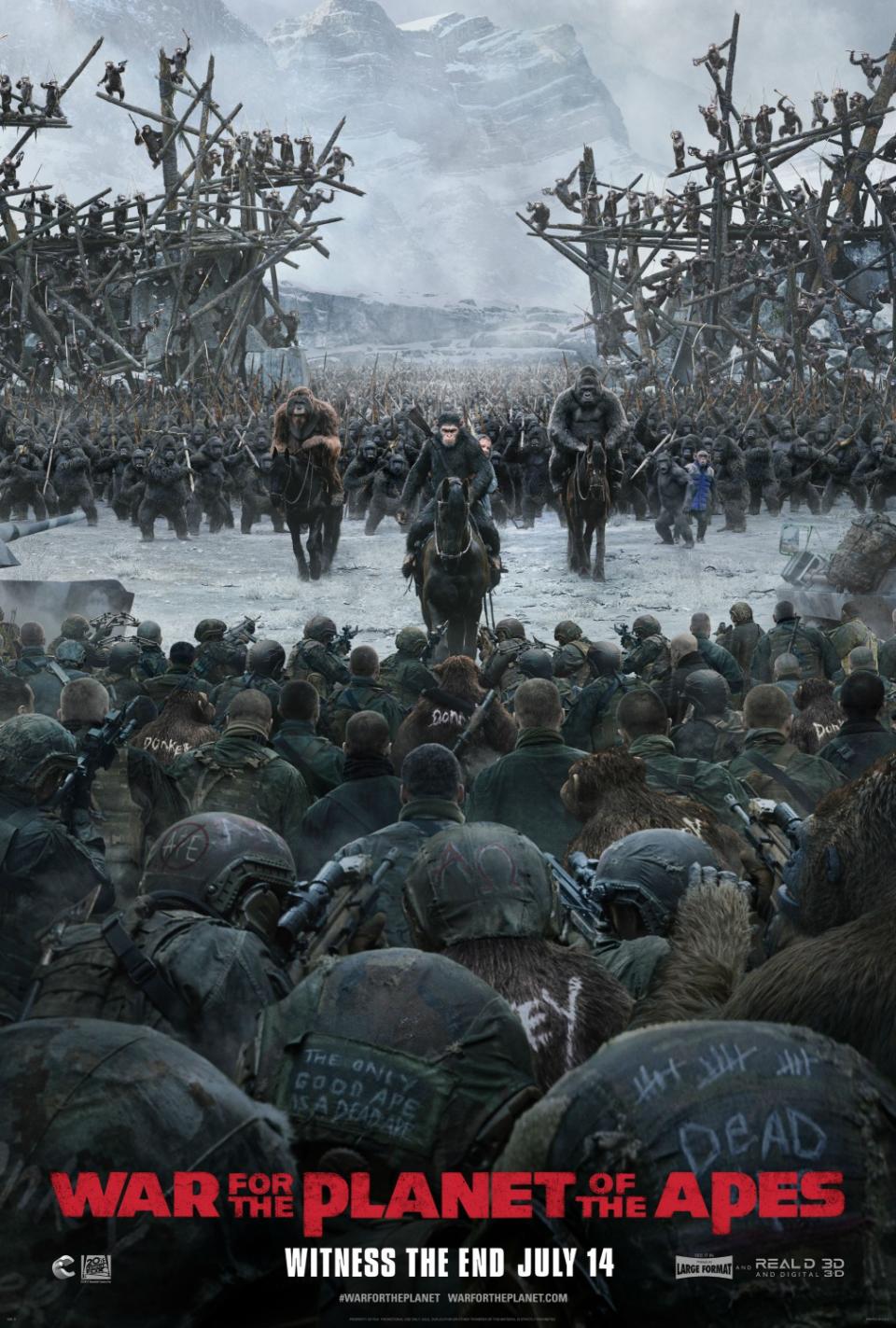
Sure. There’s only so much drama you can get out of battles. I felt that it was important to have that, that that was the context, but the war that was most important to me, was the war that was inside of Caesar.
When [screenwriter] Mark Bomback and I sat down to write, we watched a ton of movies. We wanted to get inspired, and we looked to ambitious places. We looked at ‘The Bridge on the River Kwai’, and ‘The Great Escape’, [and] the movies that were war movies that really resonated were the ones where the war was the context, but the foreground was all about the intimate relationships with the characters.
For me, what I thought this story was about, was about taking Caesar from where he’s gone in ‘Rise’ and ‘Dawn’ and pushing him to the realm of the mythic. The three films are very different. ‘Rise’ is very different to ‘Dawn’ and ‘Dawn’ is very different from ‘War’, but the one constant is your connection to Caesar.

He’s had these dramatic stories in each one, and this one needed to be the most dramatic yet. We had to push him to a place that he’d never been; take him to a darker place. And it felt like if he could pass that test then he would ascend into the realm of the mythic and become the seminal figure in all ape history. He would become an ape Moses. So in a way, it was a war movie that I wanted to be like a biblical epic.
One of the war movies we watched was [Clint Eastwood’s] ‘The Outlaw Josey Wales’ which is really a Western, so there’s a way in which the story starts in the war, and then when this very dramatic event happens that bores into Caesar, it becomes a revenge Western, and then he goes on a journey up to the mountains which is like ‘Apocalypse Now’.
It’s a journey towards the mystery that is the Colonel, and when he gets there there’s a reversal there where he gets into this battle of wills that plays a bit like ‘Bridge on the River Kwai’ but also becomes ‘The Great Escape’ in a certain way. Then we needed to take things and push it to an even grander sense, in a way that felt like the parting of the Red Sea in ‘The Ten Commandments’. We wanted it to be biblical in nature.
There was this idea of taking a war movie but not letting it be conventional in any sense, letting it be a journey that you go on with Caesar, that you wouldn’t be bound by one genre per se, that you would be bound by connecting emotionally with the journey that Caesar goes on.
In ‘Rise’ and ‘Dawn’ there were a lot of human characters to do a lot of the emotional heavy lifting. Here there are practically no sympathetic human characters beyond Nova.
And for the Colonel, he is someone we encounter from Caesar’s point of view. What I wanted was a full ape point of view movie, and it was what I pushed for in ‘Dawn’.

Caesar was a major character in ‘Dawn’ in the story they [initially] presented me, but it wasn’t the story we ended up doing. It didn’t have the civilisation they’d created; it wasn’t as much of the Shakespearean story that we tried to tell of these two brothers [Caesar and Koba] that end up being turned against each other by the events of the story. That was an attempt to make it as heavily ape point of view as possible.
That story, because of the dramatic change in the world from ‘Rise’ to ‘Dawn’, it was important to have the human perspective as a counterpoint because so much had changed. You needed to understand their world. There would be no way to fully understand that from an ape point of view, even though it went way over towards the apes. If you were going to tell this story about these two tribes that were on the same piece of land and the question of co-existence, you had to tell the human story too.
But I feel the trajectory of these movies has been pushing toward getting further and further immersed in the ape point of view. It was my goal, that was my pitch to the studio. I said to the studio that this was what we were going to do, ‘I want to tell an ape point of view story, I feel like we’ve earned it’.
I feel like if you’re coming to these movies, you’re coming because you connect to Caesar, and now we need to fully embrace that. They went along with it.
Talking of the Colonel, he’s got a cult of personality around him, he’s building a wall, this all feels very topical with President Trump – was that intended?
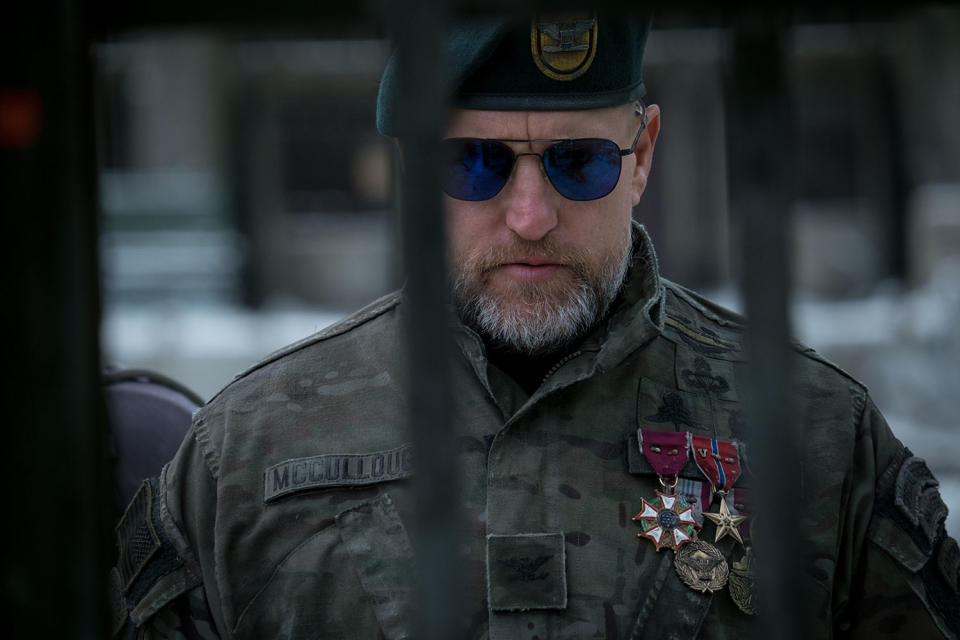
You know what, I can tell you that it wasn’t something that we were thinking about because we wrote the script three years ago. It’s funny because people are saying, ‘oh, you’re doing that’, but we weren’t actually. What we were trying to do is tell a war story and try and hold up a mirror to our nature and look at it.
For all the brutality and all of the extremity of the Colonel’s actions, it was our goal to humanise him. So he is a character who I see as the antagonist but not an outright villain, because I think if you’re going to do a war story you can’t be dismissive about our capacity for darkness and extremity. The idea is that this is within us.
One of the things in working with Woody on the character, and he had tremendous ideas that we wrote into the script, because it was all about making it as human as possible. He was created in extreme circumstances, and he does extreme things. As you’re following Caesar’s point of view, when you’re the apes, and you’re going towards him, he seems like a monster.

But then, when you get to him, there’s a moment where he reveals himself to Caesar and in that moment he has more in common with Caesar that Caesar would like to admit. He isn’t in the same situation as the apes are. The humans are in a horrific situation and you have to ask yourself what you would do.
Everything the Colonel says is actually true. That was one of the things that I really wanted, was to make sure that there wasn’t anything he said – that’s the whole idea behind him talking about the future, and saying ‘if we fail in this test, then this is going to become a planet of the apes, and we will be your cattle’. He’s describing the ’68 movie, and so I wanted it to be that you couldn’t dismiss what he said, and that would be unsettling because he did some dark things, and I wanted it to be a comment on our nature.
It just happened that in the interim [between ‘Dawn’ and ‘War’] that as we’ve gotten closer and closer to completion and the release of the film, that events that are happening in our world seem to be aligned with things that happen in the movie. That was totally unintentional.
You’ve said that ‘War’ completes this arc of the story, does that mean you’re done with it too, or do you hope to continue working on it in some capacity?
I hope to stay. What it means is that we have completed that mythic leg of Caesar’s journey. He’s had such a dramatic story through these three films, and this is the story that cements his position as the mythic figure for all ape kind, as the legend, the ape Moses. That was the goal.
The other thing that we’ve been trying to do all along, and in this story we see that the idea is that the world is revealed to be much larger than the apes ever imagined. Bad Ape is actually a seed that is a forest. There are apes who grew up without the benefit of Caesar’s leadership and they might not just be pockets of one or two, there might be actually colonies, and might that be where future conflicts come for Caesar’s apes?
They have the benefit of the integrity that he’s instilled in them, so what’s going to happen when they encounter others who didn’t have that? So all of that is moving us towards the world of ’68 movie, which is totally different.
Caesar’s apes are not like those apes [in the ’68 movie] and Nova is a nod towards that. None of which is to say, there’s nothing literal about the connection, that’s more of a trajectory. That changed in ‘Rise’.
It’s clear, in the original story when [Charlton Heston’s character George] Taylor comes to this planet, he doesn’t think it’s planet Earth, and then he realises it is, that’s the big twist of the movie.
You realise that evolution, 5000 years of evolution, after the humans have destroyed themselves, have allowed the apes to take over the planet. That’s accelerated and changed dramatically through the ALZ-113 in ‘Rise’, so they’ll never meet up, but what it does is it tells the end of the story in a way that is taking all of these stories and removed the question of ‘what happened?’ and instead focussed it on the ‘how?’
So this ends up getting to be a blockbuster that’s all about character and all about the sort of thematic, of us holding the mirror up to ourselves.
Watching the film I couldn’t help but think of similarities with Nolan’s Dark Knight trilogy, another blockbuster series with pulpy roots, that doesn’t talk down to its audience. Is he an inspiration for you?

What I love that he did was that he took the genre seriously. By that I think what it is, is that he obviously did what I have discovered for me – I never imagine as a genre filmmaker – but what studios are willing to make at the moment is a very, very narrow band of films. What I discovered is that this genre has the potential to be about something more. You can use the metaphors of the genre to talk about [a lot].
That happened for me on ‘Cloverfield’. That was what ‘Gojira’ [‘Godzilla’] was all about, this whole idea of using fantasy, or that one fantastical element, as the cover to smuggle in something that was very personal, that was very real, that had resonance in the world. I feel like that has been the gift of being in this franchise for me. And that’s obviously what [Nolan] was doing.
I think the other thing that I really admire in what he did was knowing what it is to make a big studio film, which often can fall into that sense of committee filmmaking where there’s an anonymity to the point of view of the film.

To me, coming from smaller films, I always felt like it I had to have an emotional compass that told me what to do, and I always worried about the idea of doing a blockbuster because I felt like you could be consumed in that, and you would lose yourself, and you would not be able to express that point of view, then the film, frankly, would not be very good.
What I admire in what [Nolan] does is that, despite being a filmmaker in an enormous system, his perspective comes through. That to me was very exciting, it’s always exciting when you see a film of his because of that. That’s what I feel like I’ve been trying to do, it’s trying to allow a perspective to come through despite the fact that we’re in this very large studio movie world.
Do you see parallels between Caesar and Bruce Wayne? They’re both haunted by grief, they stand up against injustice, they don’t like to kill…
That’s exactly right. The thing is exactly what we were just talking about with this idea of the cover of the genre. I think that the metaphors of both of the franchises enable you to tell stories that have deep emotional resonance.
It’s my hope to tell a very emotional Batman story and I do see a very strong parallel between them because they’re both damaged characters who are grappling to the do the right thing in a very imperfect world. A world that’s filled with all of the corruption that is human. So I do see that.
That’s actually what excites me about it. It’s interesting because I was obsessed with both as a child, and yet there is something potentially very adult about what you can explore under the cover of that fantasy. That is what draws me to it, and that’s what I’m excited about.
The success of Wonder Woman must feel like a blessing?
Sure, it’s really thrilling. I’m really so excited for what Patty Jenkins did, I think that it’s really exciting.
‘War for the Planet of the Apes’ arrives in cinemas on 11 July.
Find out what Andy Serkis and Steve Zahn had to say about playing apes below…
Read more
Emma Watson flop dumped on Netflix
How to see Dunkirk in 70mm
Alec Baldwin slammed for ‘blind’ role

 Yahoo Movies
Yahoo Movies 

